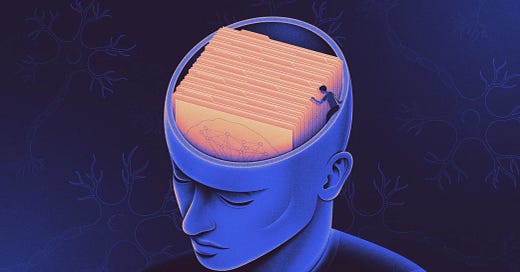"Mum, nothing is sticking in my head!"
How changing the way your teenager makes notes will improve their memory
Almost every day,
A parent asks me a question about how their teenager can improve their memory.
And I explain that the most concise answer that I can give you,
And the answer that I have written about before in my newsletters,
Is that everyone is asking the wrong question.
-
Everyone seems to be obsessed with HOW their teenager revises.
Whether they are an audible, kinetic or visual learner,
Whether they use flash cards, mind maps or active recall.
When the far more important question everyone fails to properly ask or answer is WHAT.
There is far too much content for your teenager to remember everything fully and equally.
Which means that your teenager needs to prioritise.
But students very rarely consciously consider how to prioritise,
And even more rarely make this decision from an informed perspective.
-
What NOT How
Let’s imagine I am revising for my GCSE Chemistry exam.
What do I do?
To start off,
I am going to do a couple past papers (this could be 1/2/3 – the more you do the more data you will have but it will also take more time).
I am going to set a 30 minute timer and only do the questions I may know but am not sure (no super hard or super easy questions).
After marking the papers I have identified electrolysis is the place where I am losing the greatest number of easy marks.
I then start revising electrolysis.
-
Firstly, I am going to summarise the information from the textbook/CGP revision guide on electrolysis.
I know some people find this overwhelming/difficult/confusing and I do appreciate that,
Sometimes it can feel much easier just to watch a video.
Personally, I recommend you do both and I have a strategy to make it easier.
-
Using Ai – specifically Chatgpt – you can get assistance in summarising information.
I find that especially for students aiming to pass or achieve a middling grade,
If they don’t understand the textbook in the first place,
The are going to find it very difficult to summarise.
I am going to write a whole newsletter on Ai soon as I know some parents are unsure and I think there are a lot of ways to use it right and a lot of ways to use it wrong,
But for now I do really think it can especially help a lot of students,
And furthermore,
When it comes to memorisation,
Digging into a point or sub-topic through Ai is going to be one of the most effective strategies to improve long-term memory.
-
Whilst making your notes
When most people make notes they switch their brain off.
We want to start memorising WHILST making notes.
We do this by talking to ourselves during the process.
I recommend three questions to keep in mind,
And parents,
If you really want to help your teenager,
Stick these questions up above where your teenager revises.
1) How does this point connect to the previous point I just wrote?
2) How can I elaborate on this point?
3) How could this point be asked as an exam question?
You can read more about how to practically ask and answer these questions in the below newsletter:
https://joelfreedman.substack.com/p/how-to-make-memorable-notes
-
Whilst making flash cards,
You want to be more intentional with what you are putting on the card.
Firstly,
A flash card should be a trigger,
It should have a few words on it,
Perhaps an image,
And it should relate back to your longer notes from the textbook or videos that you will look to if needed.
The things that make it onto the flash card should be the more important information with specific references to the language and phrasing needed in the exam.
-
I will write more about these techniques in the future but for now I just wanted to give an overview of what effective memorisation can look like,
I hope you have a great week ahead,
Best wishes,
Joel
P.s If you want some more information on our 1 on 1 Revision Coaching & Tutoring services send me an email to joel@ilscoaching.co.uk



